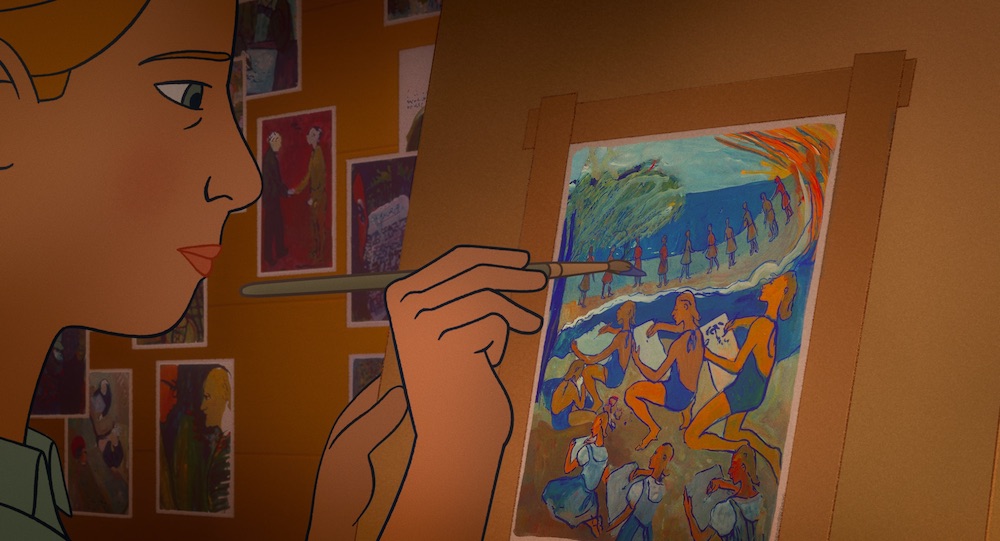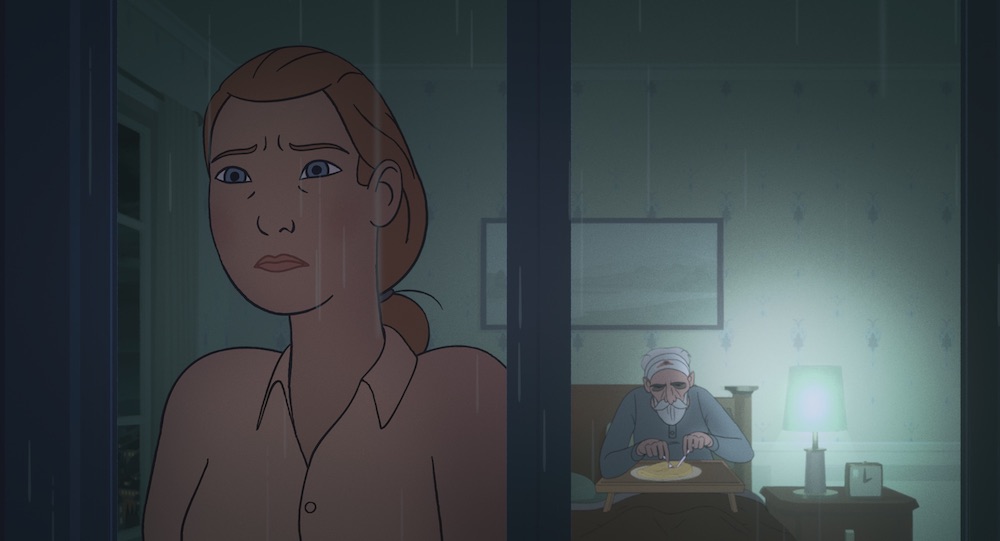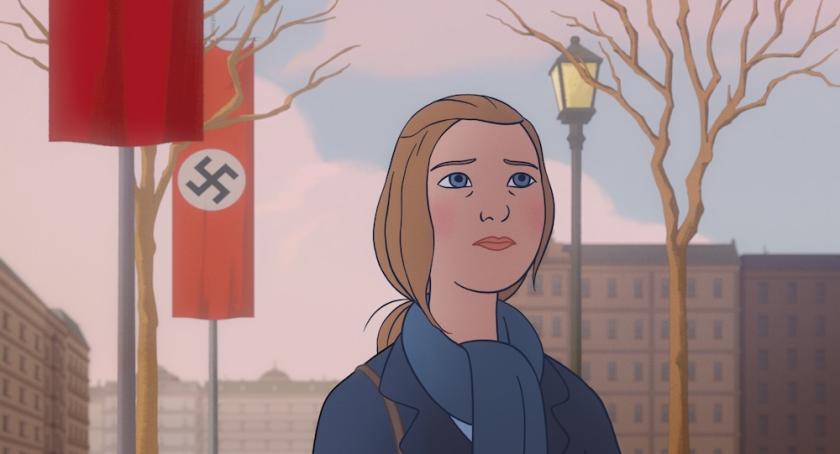“Only by doing something mad can I hope to stay sane,” says Charlotte Salomon (voiced by Keira Knightley) to her lover, Alexander Nagler (Sam Claflin). “I feel it inside me, the same demon that’s haunted so many in my family.”
Both are Jewish refugees in Villefranche, near Nice in the south of France, in 1943. Her mad, courageous plan is to paint the story of her life (it’s considered by some to be the first graphic novel). The demons are not just the Nazis, but the suicidal impulses that claimed her mother, her great-uncle, her aunt Charlotte and now her Grossmama (grandmother, voiced by Brenda Blethyn), who throws herself from a window while Charlotte is out buying flowers for her.
This animated feature by Tahir Rana (Angry Birds) and Eric Warin (Leap!), with a screenplay by David Bezmozgis and Eric Rutherford, is the true story of the artist who was murdered in Auschwitz at the age of 26 (she was five months pregnant with Nagler’s child).
As such, it can’t fail to be moving and deeply painful, though the rather conventional, pastel-hued, 2D animation is somewhat at odds with Salomon’s vibrant Expressionistic style and the terrible events themselves (it’s much less adventurous than Flee, for example). However, along with Knightley’s clipped, restrained tone (Marion Cotillard stars in a French version) and a starry cast, it makes for an effective simplicity that’s very watchable, even if the narrative does skim the surface. And it’s more about her reactions to her family’s mental illness than her art, though both are entwined. We do see her creating her extraordinary paintings, a series of 769 artworks that she calls “Life? Or Theatre?” (She gave them to a doctor friend for safekeeping and they are housed at the Jewish Historical Museum in Amsterdam). It contains every memory from my life, she tells Alexander, some of which never happened but are none the less true.
And it’s more about her reactions to her family’s mental illness than her art, though both are entwined. We do see her creating her extraordinary paintings, a series of 769 artworks that she calls “Life? Or Theatre?” (She gave them to a doctor friend for safekeeping and they are housed at the Jewish Historical Museum in Amsterdam). It contains every memory from my life, she tells Alexander, some of which never happened but are none the less true.
The film doesn’t include the fact that she may have been sexually abused by Grosspapa (Jim Broadbent), an exceptionally mean-spirited bully who makes Charlotte’s life even more difficult than it is already. We do see her poisoning him with a Veronal omelette, however (she confessed to this in a document that was kept secret until 2015). Which is shocking enough, but as we’re not told about the abuse, which she accused him of in the same document, it seems rather extreme.
The first half of the film is set in Berlin, where a free-spirited teenage Charlotte is living with her doctor father Albert (Eddie Marsan) and stepmother Paula, a classical singer (Helen McCrory in her final role). In spite of Nazi stipulations about Jewish quotas – and the disapproval of Paula, wants her to work as a seamstress because life as an artist is too hard - she’s accepted by the Academy of Fine Art in 1936, to her great joy. She falls in love with Paula’s voice coach, Alfred Wolfsohn (Mark Strong), who admires her art. “It doesn’t matter if life loves us, but that we love life,” is one of his sayings, along with, “Happiness runs much deeper than suffering.” But their relationship - and his aphorisms - are doomed. Plus, she catches him kissing his fiancée. Soon Nazi persecution forces her parents – her father is briefly interred in Sachsenhausen concentration camp after Kristallnacht – to send her to join her grandparents in the south of France, where they’re staying with Ottolie Moore (Sophie Okonedo), an American who sheltered a number of refugees. (The timeline and logic here isn’t always clear. Her parents manage to escape to Holland; they survive the war and the film ends with archive footage of them discussing Charlotte's achievement.) Her grandmother is deeply depressed and as soon as her grandfather notices Charlotte's friendship with Alexander – “You would choose that scarface over us?’ – he forces her to leave with him and Grossmama for an apartment in Nice, which is where her grandmother plunges to her death from the window.
Soon Nazi persecution forces her parents – her father is briefly interred in Sachsenhausen concentration camp after Kristallnacht – to send her to join her grandparents in the south of France, where they’re staying with Ottolie Moore (Sophie Okonedo), an American who sheltered a number of refugees. (The timeline and logic here isn’t always clear. Her parents manage to escape to Holland; they survive the war and the film ends with archive footage of them discussing Charlotte's achievement.) Her grandmother is deeply depressed and as soon as her grandfather notices Charlotte's friendship with Alexander – “You would choose that scarface over us?’ – he forces her to leave with him and Grossmama for an apartment in Nice, which is where her grandmother plunges to her death from the window.
Salomon’s ongoing battle with Grosspapa and his sadistic demands that she fulfil her duty comes across very effectively. He calls her a selfish, stubborn granddaughter only good for a few slapdash paintings. “How long before you kill yourself too?” is one of his final, monstrous questions before she gets out the Veronal. As the Nazis catch up with her and Alexander, we hear their screams but see only the placid, sunny landscape of the south of France. Luckily, we have her art to remind us of her life.















Add comment